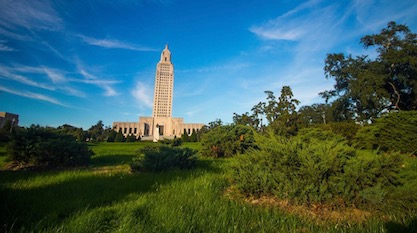 Education
Education
 Free Speech
Free Speech
On Academic Freedom Laws, National Law Review Takes a Tumble


Just because someone is in law school and writes in a law publication does not mean that she understands the law as it pertain to teaching about evolution. Take Megan Sullivan, for example, a student at New England Law in Boston, who writes in The National Law Review.
The title of her article kind of says it all: “‘Alternative Facts’ in the Classroom: Creationist Educational Policy and the Trump Administration.” She talks about the First Amendment and “anti-intellectualism” in the current administration. I will leave the politics here aside. But being a careful reader is vital for a would-be attorney, and Sullivan could stand to polish her own skill. She notes at one point, for instance, that “President Trump has intentionally taken a neutral stance” on evolution.
But her footnote for this, from the “Friendly Atheist” blog, only contends that Trump “received a memo from a campaign adviser,” an unidentified “someone,” who advised neutrality. What Trump did with the advice, whether he read it much less adopted any “intentional stance,” is not indicated.
Louisiana and Tennessee
Of more direct interest for me, Sullivan completely misunderstands academic freedom legislation, again from an evident failure to read carefully. She writes, “Two states already allow creationism and the theory of evolution to be taught side-by-side, and more such legislation is being aggressively pushed forth.” Looking at the citation for what Sullivan is herself pushing forth, I find the states referred to are Louisiana and Tennessee. These states have academic freedom laws, which expressly do not protect teaching about religion. Therefore they do not “allow creationism.”
She goes on:
In 2019 alone, five anti-evolution bills have been introduced, most of which protect teachers who wish to “teach the controversy,” “diversify the curriculum,” and present “strengths and weaknesses” of scientific theories. These bills have largely been introduced under the supposed secular interest in “academic freedom.” However, they are extremely problematic in that they allow the teaching of “alternative” theories to evolution as though those theories were equally scientifically valid, while in reality they have virtually no support from the scientific community. While some individual scientists have professed a belief in intelligent design, no major scientific organization has backed it. Because intelligent design is firmly grounded not in science, but in religion, this amounts to legislature presenting a religious belief as a scientific fact, which cannot be tolerated under the First Amendment.
What a mess Megan Sullivan has made of her research. I cannot speak to all bills presented in the United States this year. But I can say with certainty that the academic freedom legislation proposed in states like Oklahoma and South Dakota in 2019 did not attempt to authorize the teaching of intelligent design. ID is not “grounded in religion” but in scientific evidence. However, that’s really beside the point. Just read the wording of the proposed legislation — you will not find “intelligent design” anywhere in these bills. Rather, they are limited to topics already covered in the curriculum. Academic freedom legislation permits teachers and students to examine controversies at the highest levels of mainstream science (in conferences and literature) over evolution and other theories. Intelligent design, as a controversial minority viewpoint, is intentionally not included.
She continues:
Perhaps even more troubling than the possible influence on legislatures is the tendency of individual teachers to seize on public sentiment in order to insert their personal beliefs into their curriculum, with or without legislative approval. An overwhelming acceptance of “alternative facts” and the dismissal of differing points of view as “fake news” by the current administration sets the precedent that it is acceptable for teachers to introduce their doubts about accepted science into the classroom. By openly questioning evolution, the President can send the message that it is perfectly acceptable for teachers to do the same. This phenomenon is already observable in many more conservative states; for example, in Louisiana, where “academic freedom” laws permit the teaching of creationism in school, a local journalist reported that schools were utilizing Genesis as “supplemental material” in order to “debunk” evolution. In the same report, at least one teacher insisted that she would never teach her students that they had evolved from apes, stating that “God made science, and unlike many adults, these kids KNOW that.”
Check Your Sources
Her source there is an article from Vice News, in turn quoting from an article by activist Zack Kopplin, who has made a specialty of misleading the public about the intent of the Louisiana academic freedom law. The teacher mentioned would find no protection under the law. As I noted, academic freedom measures, such as Louisiana’s 2008 Science Education Act, do not permit teaching creationism. Louisiana’s law specifically states it “shall not be construed to promote any religious doctrine, promote discrimination for or against a particular set of religious beliefs, or promote discrimination for or against religion or nonreligion.”
Sullivan’s logic fails her. If the Supreme Court says it is unconstitutional to teach creationism (which she says was established in Edwards v. Aguillard) in public schools, and there are laws that permit this (which she says academic freedom laws do), then these laws would be struck down in court as unconstitutional. But Louisiana’s law has been on the books for more than ten years, and Tennessee’s law for about seven years.
Into the Æther
Her analysis of Edwards v. Aguillard is not entirely incorrect, although it is certainly off-base at points and incomplete. The court indeed struck down Louisiana’s Balanced Treatment Act because it said the law violated the First Amendment under the Lemon test. However, it also noted: “We do not imply that a legislature could never require that scientific critiques of prevailing scientific theories be taught.”
Scientific critiques of evolution are permitted. Furthermore, these scientific critiques abound in the academic literature.
Sullivan’s repeated use of the phrase “anti-evolution” is not just grating, it is inaccurate. Admitting to students that neo-Darwinism has strengths and weaknesses is not “anti-evolution.” It is pro-getting at the truth, meaning that it’s pro-science. When scientists began to question the mistaken scientific doctrine of the æther, it was not because they were “anti-æther.”
To question widely embraced ideas by following the evidence is simply the way of good science. To read your own sources is the way of good law, and good journalism. I commend all of these to Megan Sullivan.
Photo: Louisiana State Capitol, by Antrell Williams, via Flickr (cropped).
